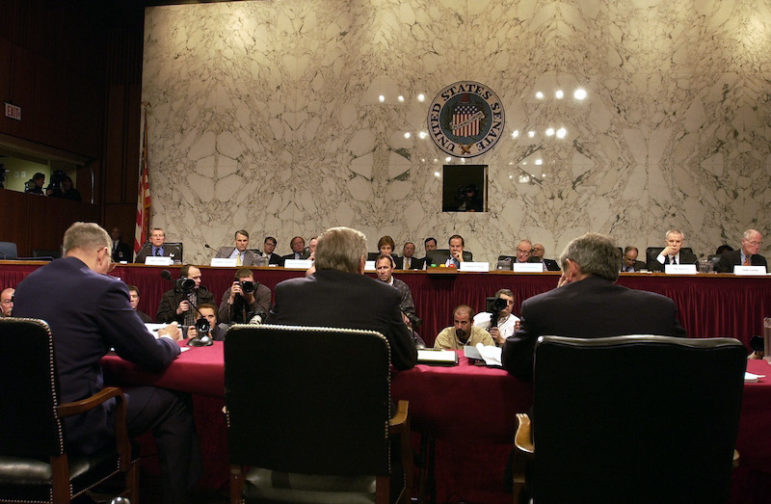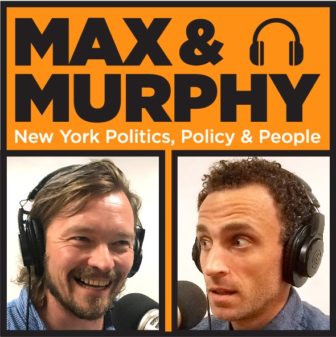The Empire Center’s Bill Hammond told the Max & Murphy Show that the controversy over death data and nursing-home policy reflects deeper questions about decisions made in the disaster’s early days.

Staff Sgt. Jerry Morrison Jr./USAF
Defense leaders testify to the National Commission on Terrorists Attacks Upon the United State, a.k.a. the 9/11 Commission, in March 2004.At some point in the months ahead, when hospitalizations for COVID-19 are at a minimal level, herd immunity has been achieved, schools are reopened and businesses are as close to pre-pandemic normal as they can be, it will not be time to turn the page on the virus that took tens of thousands of lives and forever changed hundreds of thousands more.
It will be time to figure out exactly what happened.
So says Bill Hammond, the researcher who has most doggedly tracked the nursing-home scandal that—among other things—has placed Gov. Andrew Cuomo in the deepest political peril of his career.
On Wednesday’s Max & Murphy Show on WBAI, Hammond, the senior fellow for health policy at the Empire Center, called for the formation of a commission to investigate the coronavirus response.
“Somebody should create a commission,” he said. “I’m a little surprised the legislature hasn’t been more proactive on this.”
After the 1970s fiscal crisis nudged New York City to the brink of bankruptcy and ushered in a generation of austerity programs that profoundly reshaped the city’s essence, the Securities and Exchange Commission drafted a thorough report that held not just Mayor Abraham Beame but also the major banks accountable for the moves and mistakes they made.
The National Commission on Terrorist Attacks Upon the United States, popularly known as the 9/11 Commission, released a probing written account of decisions made everywhere from the CIA and the FAA to the FDNY; just as important, its hearings produced essential moments of accountability, like Richard Ben-Veniste’s grilling of Condoleezza Rice.
There was even a federal inquiry into the 2007-2008 financial collapse.
In other words, three of the five crises that reshaped life in the city since World War II have been the subject of independent, intense, expensive, imperfect but useful postmortems. The fourth, Superstorm Sandy, where the city’s response was a mix of great successes and abysmal failures, somehow escaped that level of outside scrutiny and instead, the Bloomberg administration examined itself. New York is still living through the fifth one.
There have been questions about elements of the response since the first phases of the crisis. Recent comments by former city health commissioner Dr. Oxiris Barbot have revived questions about Mayor de Blasio’s handling of the early days. And for months, Hammond and others have raised questions about Cuomo’s March 25, 2020 order directing nursing homes to accept COVID-19 patients being released from hospitals—a move to free up hospital beds for sicker people that might have spread infection among nursing home residents.
“It was a mistake. The March 25 policy was a mistake. It may have actually cost some lives. I think it probably did. But it probably wasn’t the worst mistake that they made during the pandemic,” Hammond told WBAI. “Part of the shame of this is that the cover up and all of the wrongdoing associated with the coverup is drawing a lot of attention, and it should. What’s not getting sufficient attention is what went wrong in the early stages of the pandemic: What signals were missed, what decisions were delayed, what people were listened to or not listened to, what experts were involved?”
Hammond, whose quest for nursing-home death data helped to finally drive the state to come clean on that matter—and led him to be dismissed and then, when convenient, embraced by the Cuomo team—stressed that it’s only part of the picture New Yorkers need to get.
“We need to improve the transparency of state government. That’s an important thing to do. So holding the governor accountable for withholding data is important. But we need to get past that to a discussion of the pandemic itself, which I don’t think we’ve really had yet,” he said. What’s needed is something akin to the granular, careful investigation the National Transportation Safety Board does after an air accident, he added.
“It may find in the end that pilot error was part of the crash. But if it does, it doesn’t just throw the pilot in jail. It tries to figure out, what we can do to prevent the next crash? What can we do to prevent the next pilot from making this error?” Hammond said. “That’s the kind of thinking I think we need around everything about the pandemic–not just nursing homes, but every single part of the pandemic.”
Hear the conversation below:
Bill Hammond on the nursing-home scandal and the bigger questions it raises
Murphy is the 2021 Wayne Barrett Fellow with Type Investigations









